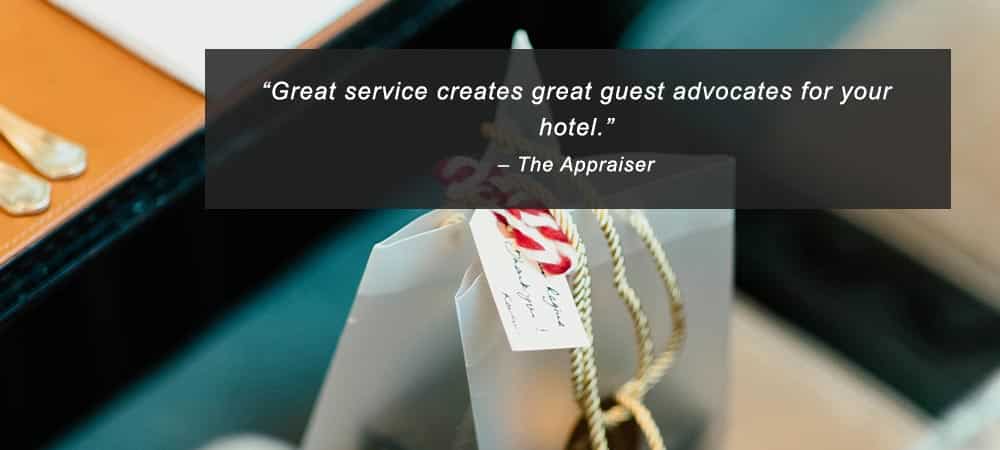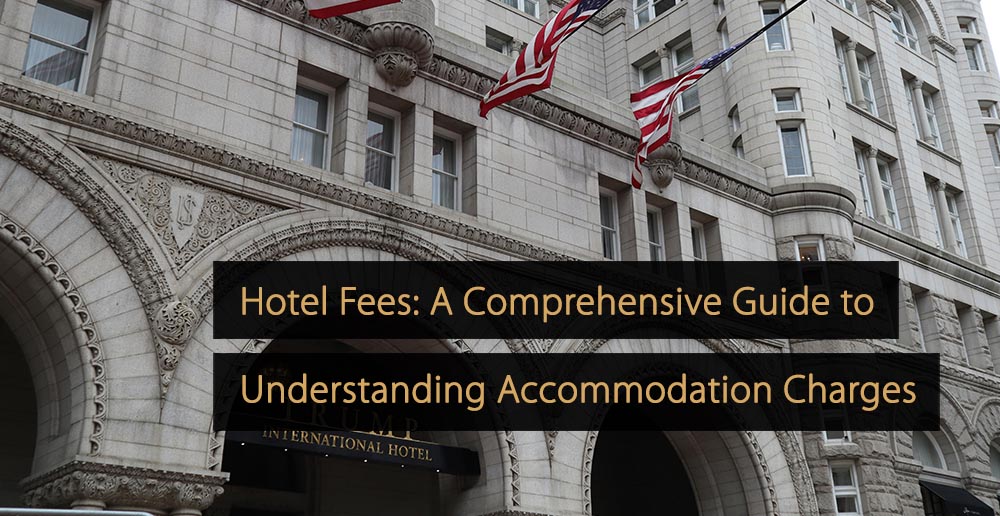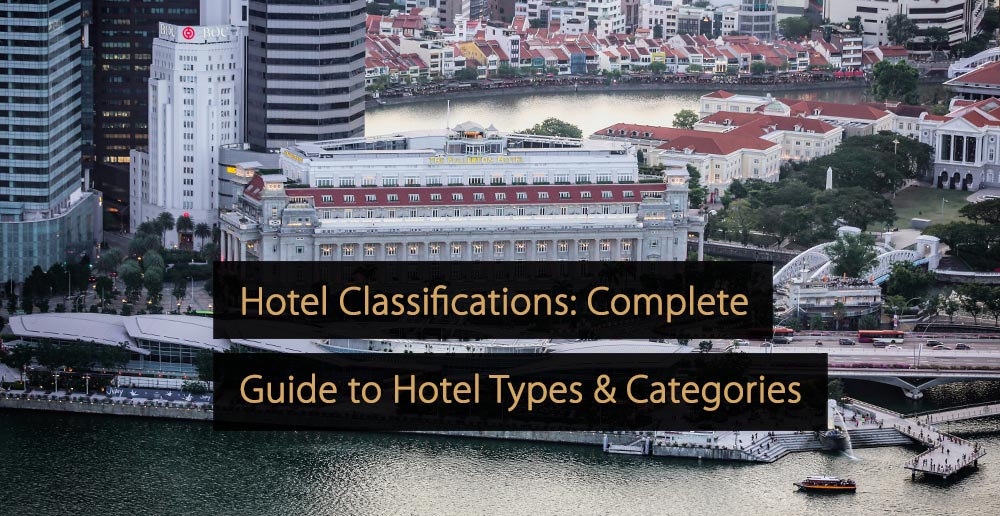Greeting and welcoming guests includes everything from a verbal introduction to providing a written welcome message. Your greeting may also involve leaving gifts, offering useful information and answering questions.
The importance of these initial interactions is difficult to overstate because guests will often make snap judgments based on them. You never get a second chance to make a first impression, so make it a good one.
In this article, you will learn all about greeting and welcoming guests, including what it looks like and why it matters. You will also read examples of ways you can get this process right and make a great first impression.
Table of Contents:
- What Does a Good Hotel Guest Greeting Look Like?
- Why Greeting and Welcoming Guests is So Important
- 10 Examples of Greeting and Welcoming Guests Effectively
- Adopt a Personalized Approach to Welcoming Guests
- Get Started With a Verbal Welcome and Introduction
- Ensure Your Front Desk Employees Dress Smartly
- Consider Offering New Arrivals a Welcome Drink
- Train Your Staff to Provide Accurate Information
- Encourage Staff to Ask Guests Some Key Questions
- Consider Providing Welcome Gifts for Hotel Guests
- Pay Individual Attention to Guests’ Circumstances
- Highlight Some Places of Interest in the Local Area
- Focus on Hotel Employees’ Customer Service Skills
- Top Things to Avoid When Greeting and Welcoming Guests
- How to Write the Ideal Hotel Welcome Message
- Appealing to Different Types of Hotel Guests
What Does a Good Hotel Guest Greeting Look Like?
When greeting and welcoming guests, you should verbally welcome them to your hotel, while adopting positive body language. Smile, try to make them feel at ease, and, when possible, use their name.
Ask questions to gather the information you need and provide opportunities for guests to ask questions, too. Make sure staff are well-trained and know about hotel facilities and services. It is also important for front desk staff and anyone else welcoming guests to maintain a positive attitude, even if things get difficult. Adopt a friendly and approachable demeanor even if the reception area is busy, the guests are short-tempered or the workload becomes high.
Why Greeting and Welcoming Guests is So Important
Greeting and welcoming guests is crucial because you want to provide guests with a positive first impression. The early interactions guests have with hotel staff can shape the entire guest experience.
You need to use these interactions as an opportunity to put guests at ease and make them feel valued. It is also important to provide useful information, so guests know how to access services, how to use hotel technology, who to contact if they have problems and where they need to go to find their hotel room.
Those in hotel management and the front office need to understand the value of a good greeting. It can set the tone for the way staff treat guests and can put guests in a good mood immediately. By contrast, a poor welcome can generate a negative response, adversely affect a guest’s mood and spoil the arrival experience.
10 Examples of Greeting and Welcoming Guests Effectively
If you want to succeed in the hotel industry, greeting and welcoming guests effectively can set you on the right path immediately. Here, you can access 10 examples of how to deliver a positive welcome.
1. Adopt a Personalized Approach to Welcoming Guests
A great way to take greeting and welcoming guests to the next level is to personalize it. This could be as simple as using their name, but you could go further and provide personalized recommendations, based on customer data.
Personalization is one of the major hotel trends to be aware of and is important for making guests feel valued. When guests feel like they are treated as individuals, it feels like your hotel truly cares about them.
With personalized recommendations, your hotel app can be invaluable, helping you to understand preferences. You can also use your app to deliver push notifications with recommendations or personalized special offers.
2. Get Started With a Verbal Welcome and Introduction
The best way to welcome a new guest to the hotel is to give a verbal greeting and an introduction. Hotel staff should thank the guest for choosing your hotel and introduce themselves.
Greeting and welcoming guests verbally can help to immediately put them at ease. Introductions can also help to make these initial interactions feel more personal and less like they are on a metaphorical conveyor belt.
Talk them through the check-in process and talk to them briefly about hotel amenities and services.
3. Ensure Your Front Desk Employees Dress Smartly
Next, you need to make sure all of the staff who come into contact with guests during their arrival process are dressed appropriately. This will usually mean wearing a smart uniform, so they are easily identifiable as employees.
This step is sometimes overlooked, but it is important to remember that guests make snap judgments about what they see as well as what they hear. Your employees are a visual representation of your hotel.
Think about what your uniforms say about your hotel and whether they are conveying the right message.
4. Consider Offering New Arrivals a Welcome Drink
Your hotel can stand out from rivals by immediately greeting and welcoming guests with refreshments. A simple, non-alcoholic drink can go a long way to making guests feel like they are going to be looked after.
This simple gesture shows guests that you want to make their stay as pleasant as possible. It can also be a great way to take some of the stress out of the arrival process and help guests to relax and unwind.
Work with your bar staff to come up with ideas for a tasty, cost-effective welcome drink selection.
Video: 11 SUPER EASY HOSTING TIPS FROM 5 STAR HOTELS — IMMEDIATELY MAKE YOUR GUESTS FEEL WELCOMED!
5. Train Your Staff to Provide Accurate Information
While greeting and welcoming guests, your front office staff are likely to provide them with various pieces of information. However, you need to try to avoid situations where this information is inaccurate or misleading.
Training staff to provide accurate information is important for building trust. If guests follow up on information they have received and it checks out, they are more likely to trust the next piece of information you give them.
Hold regular training sessions and cover the topics that come up frequently when welcoming new arrivals.
6. Encourage Staff to Ask Guests Some Key Questions
Try to make sure staff know how to extract valuable details from new arrivals through intelligent questioning. Do not go over the top with this, but try to find little openings to dig for information.
Asking questions is a great way to build up a picture of what type of guest you are dealing with and what they are expecting. It also makes it easier to tailor your services to them and understand what they expect.
In particular, it can be helpful to find out what they are doing in the area, whether they are visiting for business or leisure, and if they have already made specific plans for things they want to see and do.
7. Consider Providing Welcome Gifts for Hotel Guests
Gifts are an effective way to make the welcome for guests even more memorable. You will need to use welcome gifts wisely, as it may be prohibitively expensive to give every guest a gift when they arrive.
Instead, think about how you can target specific types of guests. For instance, if you know you are welcoming a new bride and groom, consider leaving some gifts in their room to make their arrival a pleasant one.
You can coordinate with key hotel operations to provide gifts like spa sessions or bottles of champagne. Greeting and welcoming guests with little extras can make them feel like you have really considered their needs.
8. Pay Individual Attention to Guests Circumstances
Much like with personalization, you can improve your greeting and welcoming of guests by paying attention to their individual circumstances. In particular, try to identify birthdays and other special occasions.
Identifying relevant circumstances is important for providing a rounded service. If you can demonstrate that you have taken time to learn about your guests, they will appreciate the extra attention to detail.
Going the extra mile is a tried and tested way of generating positive reviews when guests leave too. This, in turn, can enhance your reputation and make it easier to attract guests in the future.
Video: Accomodation Knowledge – Handling Guest Check in
9. Highlight Some Places of Interest in the Local Area
The process of greeting and welcoming guests in your hotel should include providing them with valuable information. Often, the most valuable information you can offer is advice on places to visit in the nearby area.
Giving travel advice can really help guests to make the most of their stay. Hotel staff will sometimes have local knowledge of places to see or even nearby restaurants which can be hard to find online.
It may be too overwhelming to provide this information verbally during the check-in process, when you are already going to be providing other details. Instead, consider adding this advice to your in-room welcome message.
10. Focus on Hotel Employees’ Customer Service Skills
Your employees need to have good customer service skills and they must demonstrate this when greeting and welcoming guests. This means being friendly, knowledgeable, helpful, polite and calm under pressure.
Customer service skills are essential because the arrival process will not always go smoothly. Errors can be made by guests or even by your hotel, and staff must be able to handle these situations.
These customer service skills can also help you prevent problems by ensuring guests receive clear instructions, useful advice, and high-quality answers to any questions they may ask staff.
Top Things to Avoid When Greeting and Welcoming Guests
- Lack of Personalization: When greeting and welcoming guests, the welcomes must all feel unique. Avoid using the exact same greeting every time, and make sure greetings are tailored to individuals.
- Negative Body Language: Your body language and non-verbal cues can impact how guests feel about interactions. Avoid negative body language, like hands in pockets or crossed arms and try to use open body language that will indicate you are greeting and welcoming guests warmly.
- Making Greetings Too Long: It is important to welcome guests and provide important information, but brevity is also essential. Try to avoid an information dump that will confuse guests.
How to Write the Ideal Hotel Welcome Message
A major part of greeting and welcoming guests is the hotel welcome message you leave in their room. This message can help to provide useful information and to make it clear that they can reach out if they need help with anything. The best welcome messages are also personalized and have a clear, concise message.
In the “Hotel Welcome Message for Guests: How to Write + Free Examples” article, you can find out much more about what goes into a great welcome message and access some sample messages that can help you.
Appealing to Different Types of Hotel Guests
Hotel guests are all different and have their own unique needs, expectations and opinions. This presents one of the biggest challenges when it comes to greeting and welcoming guests, but it is also a challenge in other areas too, like creating hotel marketing messages to attract families, business travelers, couples and luxury travelers.
In the “Different Types of Hotel Guests and Tips on How to Appeal to Them” article, you can gain valuable insights into how to attract different guest types and create a diverse customer base.
Did You Like This Article about Greeting and Welcoming Guests?
You might also be interested in the following articles:
- How to Write a Hotel Welcome Letter for Guests + 8 Free Templates
- How to Write a Hotel Welcome Card for Guests + 5 Free Examples
- Hotel Email Marketing: Types, Strategies and Top Tips
- Boutique Hotel Marketing Strategies to Increase Revenue
- Hotel Marketing Courses: What Will You Learn? + List of Educators
Greeting and welcoming guests is one of the most crucial ways to make a good first impression. It is essential to demonstrate positive body language, provide useful advice, avoid bombarding guests with too much information, and be willing to answer questions. Greetings should also be personalized whenever possible.
More Tips to Grow Your Business
Revfine.com is the leading knowledge platform for the hospitality and travel industry. Professionals use our insights, strategies, and actionable tips to get inspired, optimize revenue, innovate processes, and improve customer experience.Explore expert advice on management, marketing, revenue management, operations, software, and technology in our dedicated Hotel, Hospitality, and Travel & Tourism categories.
This article is written by:
Hi, I am Martijn Barten, founder of Revfine.com. With 20 years of experience in the hospitality industry, I specialize in optimizing revenue by combining revenue management with marketing strategies. I have successfully developed, implemented, and managed revenue management and marketing strategies for individual properties and multi-property portfolios.










Leave A Comment